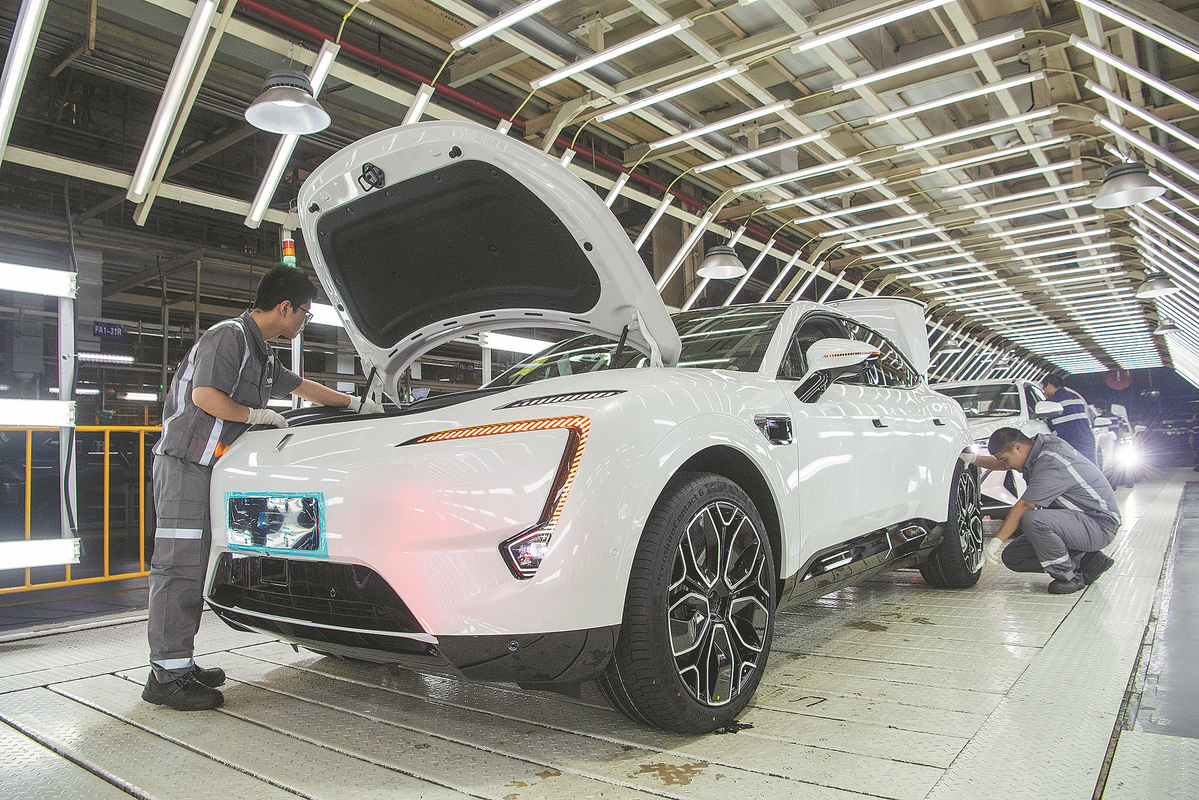On social media, puzzlement over EV tariffs
By HENG WEILI in New York | chinadaily.com.cn | Updated: 2024-05-15 10:21

The Biden administration's plan to impose hefty tariffs on Chinese electric vehicles and batteries has raised questions on social media, with some calling it anti-climate, anti-competitive and an election year gambit.
Kristoffer Santucci, a stock trader, wrote on X: "Biden gives Plug Power (a US fuel cell company) a $1.66 billion loan commitment and simultaneously tariffs China green energy related EV parts and metals. That's exactly how you stimulate inflation, fueling the fire, trying to keep this boat afloat through fiscal spending."
"I'm really curious how the team behind Biden's new China tariffs expects to hit 2030 targets for electric vehicles when they slap huge tariffs on batteries and components for batteries that fuel the EVs," posted "Will" on X.
"What to make of Biden's 100% tariff on Chinese EVs in light of the ‘existential crisis' posed by climate change that EVs are meant to combat? I look forward to the logical pretzels Biden's defenders are about to twist themselves into," wrote Marian L Tupy, a senior fellow at the Cato Institute, on X.
"If climate change is an existential threat and your top priority, why would you quadruple tariffs on cheap, Chinese EVs? How is this going to achieve a zero-carbon economy by 2040?" wrote "ConservativeNotCrazy", publisher of InsideSourcesDC.
"You can't possibly think these people take climate change or inflation seriously if they want to increase the price of carbon reducing technologies," posted Sid Prabhu on X.
"Protectionism taken to an extreme. China makes affordable EVs that move the industry forward," posted David Kudla, CEO of Mainstay Capital Management. "But they will be made artificially expensive by tariffs, thus further crushing the growth in EV adoption."
Nikhil Tiwari, who works in capital markets, posted: "Just when China started to pocket the market share for EVs around the world, Biden imposed tariffs on China's EVs and ancillaries. This is the decade of trade wars. Trade wars are highly inflationary."
"One year ago, people on X were telling me that nobody in the US or Europe would buy a Chinese EV. Today, automakers and politicians in America are freaking out about China taking over the electric car market," wrote S.L. Kanthan, a columnist and podcaster in India, to his 136,000 followers on X. "Hence the increase of tariffs from 25% to 100%. You can't hide from competition forever!"
"Early indications are that we'll see competition between the two US presidential candidates this November over who will introduce the biggest trade tariffs on Chinese EVs," wrote David Watson, a proponent of clean energy in the UK.
"While you may be right about there being situations where tariffs can work, such an approach does not look good for US EVs. I believe the US has had a 27.5% tariff on Chinese cars since the Trump years. Raising the levies further signals it's a long road to US EV competitiveness," wrote Ted Dixon, CEO of INK Research, a financial information firm in Vancouver.
"For what I believe is the umpteenth time — regardless of party or president — tariffs are paid by American consumers," wrote Kai Ryssdal, who works for nonprofit news organization Marketplace, to his 266,000 followers on X.
"Biden hiking tariffs on Chinese EVs is sad mostly because USA automakers refuse to produce an EV at $10K — which is what the Chinese are doing. I'm looking at you, Elon!" posted Joe Krulder, Ph.D.
Shares of Austin, Texas-based EV maker Tesla, where Elon Musk is CEO, closed at $177.55, up $5.66, or 3.3 percent.
Ben Chu, economics editor for BBC Newsnight, wrote: "The big deal in these new US tariffs on Chinese imports is not really the 100% tariff on electric vehicles (EVs), given US EV imports from China are negligible, but the increase in the tariff rate on lithium-ion batteries from 7.5% to 25%."
Ricky J. Marc, J.D., M.S., posted on X: "Chinese EVs smacked w/a 100% tariff? I mean if you're scared, go to church or get a dog, because God-forbid we're all able to afford EVs, reducing emissions and a reliance on petrol prices, right? Teslas don't have to be the only major EV option.
"There aren't that many Chinese EVs currently in the United States, but with how cheap they are, it was only a matter of time before the tariffs started," posted Ryan Egan.
"These Biden tariffs hurt the American consumer. We are forced (to) pay more for Chinese EVs or buy … inferior American EVs. We are forced to subsidize an inefficient US auto industry," wrote Richard D. Cadena.
"An electric SUV that converts into a pickup truck in which you can camp out? Yep, China's Changan made one. Not a single US or European carmaker will take the risk to produce a ‘niche' EV like this. Get why US and Europe are scrambling to impose more tariffs on the Chinese?" posted "Facts Chaser" on X.
Of the US move, Rukumis Geopolitics wrote "In the long term, it will have a more negative impact on the US than on China, as we saw how Huawei was able to circumvent and withstand the US pressure and sanctions.
"Chinese EV manufacturers are not only equipped to withstand the impact of US tariffs but can also leverage these challenges as catalysts for further growth and innovation."
























